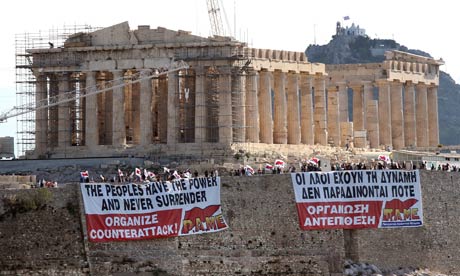Banking's bond holders and the double standards over repaying debt
Our wealth is disappearing because we are paying off not only our debts but those of bankers and their bond holders
EFG Bank holds a lot of Greece's debt. Photograph: Pantelis Saitas/EPA
When this financial crisis began nearly four years ago the story seemed simple. The banks were broke and they told our leaders that unless the taxpayers bailed them out and took their private debts on to the public account, then the world would end. Our politicians believed them. We took on huge debts and bailed out the banks. Right or wrong, at least the story seemed straightforward: they owed us huge sums of money. Then as the crisis continued, a new group most of us had never heard of appeared – the bond holders. It turned out the banks owed huge sums to the bond holders too, and so did we. The story of who owed whom began to change.
Gradually the story became less about the banks owing us money and more about owing the bond holders.It seems to me that our governments and their financial advisers from the banks have a double standard when it comes to debt and its repayment; one which greatly benefits the financial world and punishes the taxpayer.
On the one hand, the debts of private banks and those who own that debt, the bond holders, are being protected from any losses by the publicly funded bailouts. Public debt, on the other hand, at the insistence of the same banks and bond holders we have bailed out, is being paid down at breakneck speed, no matter what the cost in unemployment and the destruction of social services.
This double standard is creating two different groups with very different financial prospects: one group made of the bankers and their bond holders (the financial class), is doing rather well because, by not having to pay off its debts, its wealth – the money to make more money – is being maintained. The other group, the rest of us, find our wealth is disappearing because we are paying off not only our debts but theirs as well. Our welfare, pensions and pay are all being cut in order to appease the bond holders, while the banks and the money they owe us, seems to have almost disappeared from the story altogether.
So who are the bond holders and why are Europe's banks more concerned to pay them than us?
Finding out who the bond holders of a bank or a nation is isn't all that easy. But a few days ago Barclays compiled a chart of the top 40 holders of Greek debt. One name on the list is illuminating. EFG (European Financial Group) is the largest private holder of Greek debt. Only national banks and international lenders such as the ECB hold more.
So who is EFG? Well, they are a Luxembourg-registered group of companies. So are they from Luxembourg? Actually, no. The heart of the group is EFG Bank, which is a Swiss private bank. So they're Swiss? Not quite. The bank is 40% owned by the Greek Latsis family, whose fortune is managed by Spiro Latsis.So when Greek taxpayers have their wages cut, their pensions shrunk and see the assets of the nation sold off, they will be helping to protect the Latsis's investment in Greek debt. And it's no accident that EFG Bank holds a lot of Greek debt. The bank set up a special fund in 2009, during the crisis, specifically to buy up Greek government debt.
EFG was also a bond holder of Anglo Irish Bank. So not one but two sets of European taxpayers have been "protecting" EFG's debt investments.
All of which becomes more interesting when you step back and realise that EFG is not only a bond holder but also one of the banks being bailed out. EFG's Greek banking arm EFG Ergasias is one of the four Greek banks most reliant on ECB funding for its survival. No wonder the CEO of EFG Bank said that the Greek decision to enforce austerity and avoid default was "necessary".
EFG is not unique. The fact of the matter is that the banks are debtors and the cause of the crisis. But as bond holders they reappear in the story now not as debtors but creditors, not as the cause of the crisis but as those trying to solve it.
And for those of you who are tempted to think, well that's just Greece for you, the same dynamic is here in the UK.
In the UK we have the government considering a cap on benefits to families.The communities secretary, Eric Pickles, warned us this would lead to repossessions, homelessness and a cut in the number of people who could afford new houses, which would mean that developers would probably not build half the promised 56,000 affordable homes due to be built by 2015. Those homes would not be built because the banks would not lend to the developers with the prospect of there not being any buyers.
At the same time, a report from EC Harris LLP revealed that London has a pipeline of £21bn in luxury builds for the super-wealthy over the next 10 years, 4,000 of which will be built by 2014-15. The banks are falling over each other to lend for those projects.
And who will buy those luxury homes? Well, it will be those who are doing well out of this crisis. The bankers and the bond holders.And one last little detail just to complete the picture. One of the companies that sells and brokers deals for the luxury end of the London market is EFG.
• This article was commissioned after being suggested by lightacandle. If you have a subject you would like to see covered by Comment is free, please visit our You tell us page

Δεν υπάρχουν σχόλια:
Δημοσίευση σχολίου